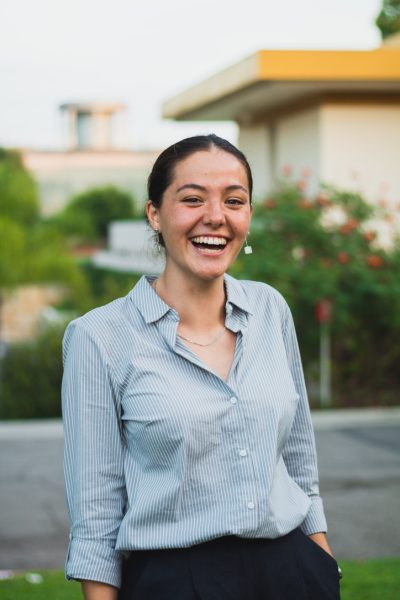Over the summer, Biola decided to cut the Diversity and Inclusion (D&I) division as a result of the rampant budget cuts happening all over campus. In the email sent to all of campus on June 4. 2024, the President’s Office stated this change and that, “we will be strengthening our biblical mission toward unity by establishing a Unity In Diversity Advisory Council, which I will chair and appoint a faculty member to co-chair with me.” On Jan. 16, 2025, the President’s office informed the school that Dr. Uche Anizor, a professor of Talbot, will chair the proposed council.
The D&I division, particularly Tamra Malone, the former Chief Diversity Officer, co-wrote both the Unity Amidst Diversity statement (UAD) and the Strategic Diversity Plan and sought to uphold the documents through institutional changes. The staff of the D&I division were excellent employees of the school and sought to honor God’s kingdom through their difficult work.
As a result of the division’s dissolution, I chose to write this letter.
To the Office of the President,
Diversity and Inclusion (D&I) needs excellent leadership — this is self-evident.
Our campus grieved the insensitive incident at Hart Hall on Oct. 28, but beyond that, we despise the culture demonstrated by these acts. These hateful acts — while perhaps intended to be harmless — reflect ignorance and complacency within Biola’s culture.
In order to form a culture that is both diverse and inclusive, institutional involvement is required. For changes relating to diversity to last, the University needs employees beyond the four-year degree of a college student, and they need people who have tasted and seen diversity and inclusion efforts to guide the school.
Good leadership comprises many things: bravery, guidance, intelligence, continuity, wisdom, etc. I fear that because of the disintegration of the D&I division, D&I initiatives and training will lack those qualities. Particularly that without centrality, institutional support and continuity, upholding the Strategic Diversity Plan becomes nearly impossible, and if not impossible, then ineffective.
I am thankful for the Diversity Council and for the work they will do to uphold this legacy, but my anxieties remain. Here’s why:
CENTRALITY
Decentralization undercuts Biola’s shared responsibility to fulfill D&I’s goals.
In the most recent email on Jan. 16, the President’s Office wrote, “Let me say a word about decentralization. I do believe that this will be a better way for us. By decentralizing our approach to diversity and community belonging — by sharing the responsibility among all of us at Biola — the goal is to build up our campus culture toward greater resilience and belonging by distributing the decision-making more broadly.”
While the idea of all members holding equal responsibility for D&I within the Council sounds desirable, decentralization is pervaded with issues.
Practically speaking, there are no designated persons to purport the Strategic Diversity Plan. For example, the plan states in Initiative 2A, that they will “create and pilot an Inclusion Guidebook across departments (e.g., academic, administrative, co-curricular) to provide best practices for equity and inclusion.” Without people devoted to the work as their job, who will create this guidebook? All of the people on the council already have full-time jobs at this university and can only devote so much of their time and effort to D&I. In fact, many of the people on the council, in their current positions, are already overworked. Adding another responsibility to their plate sets them up for failure.
Further, the concept of decentralization has many gaps. Rather than having a central body to turn to for leadership and support, there is no clear direction or place of assistance. In turn, the lack of centrality, instead of “sharing the responsibility among all of us at Biola,” as the President’s Office suggests, diminishes the responsibility among all of us at Biola.
Consider a hypothetical situation with me: without a designated office upholding the Strategic Diversity Plan (perhaps the primary way Biola as an institution is taking responsibility for D&I), the goal of 2C Strategy 1, “Human Resources (HR) and relevant administrators will assess Biola’s hiring policies and practices for both staff and faculty and make recommendations for change,” cannot be accomplished without individuals devoted to the work. As such, the HR team at Biola no longer receives regular training and updates, and gradually, D&I fades into the background as a necessary goal. This is a possible effect of decentralization dismissing “the responsibility among all of us at Biola.”
Centralization, on the other hand, actually creates a central power and direction, and in doing so, space for collaboration. Centralization bolsters the “responsibility of all of us at Biola.” Centralization brings unity. The students need a unified institution to support D&I efforts.
In short, decentralization does not empower D&I, but weakens D&I’s powers, reach and effectiveness. Decentralization significantly adulterates the pursuits of D&I.
Perhaps the most abhorrent aspect of the term “decentralization” is the attempt to put a positive spin on a clearly detrimental change. The email from the summer sent to students said, “we will be strengthening our biblical mission toward unity by establishing a Unity In Diversity Advisory Council.” At one point, this university deemed the Diversity division necessary to achieve their mission statement, but now it is actually better that there is no division!
To move forward effectively in the work of D&I, this school must face the void left by D&I, and “decentralization” is simply a way to avoid taking full responsibility.
INSTITUTIONAL SUPPORT
Students cannot fill in for the D&I division, nor can an inexperienced, fragmented council.
While students can act as support, they cannot be the primary foundation that the school leans on for D&I expertise. Even as support, students in D&I roles have a prolific history of burnout because of the effort and emotional weight the roles require. Additionally, students do not command the necessary power to provide institutional support for the student body.
What about the Council? The pre-existing responsibilities of the Council Members themselves make them unreliable as solid institutional support for students because these members have limited time, energy and expertise. This Council proposes that it can uphold the Strategic Diversity Plan, but who will actually “initiate integration of ‘Unity Amidst Diversity’ in university curriculum” (Initiative IB: Strategy 1) when, as pointed out above, the members of the council already work full-time jobs?
Additionally, even if the Council accomplished that objective, the Council does not possess any actual demarcated power or expertise to hold anyone accountable. This again points back to the issue of decentralization: without one specific person with expertise and power, there is no singular person to turn to for information, aid or accountability.
Students feel the gap between themselves and the university’s administration ever widening with the dissolution of the division of D&I, and the result is a lack of effectiveness for the faculty, the staff and the students of Biola.
CONTINUITY
A fragmented council foreshadows a fragmented future.
Without continuity of staff, stability and permanence at best rely upon word-of-mouth; at worst, these concepts disintegrate into the past. Without designated staff, it is simply a matter of time until the D&I Council simply ceases to exist. Imagine this scenario: each year the decentralized Council becomes increasingly unprofessional, unpredictable and disintegrated institutionally, so D&I efforts become ineffective and less and less money and attention will be given to the efforts. Then, D&I itself dies at Biola.
Having an experienced centralized leader integrated into the institution stabilizes D&I work by guaranteeing continual projects uninterrupted by a revolving door of members. A centralized power with expertise and institutional backing provides the stability upon which others can depend upon, and this power guarantees the continuation of effective D&I work at Biola.
IN CONCLUSION
Each of these factors — centralization, institutional support and continuity — leads to the inevitable conclusion that the Unity in Diversity Council will not be able to uphold the Strategic Diversity plan nor the Unity Amidst Diversity statement. If this university is actually to uphold the values of the Unity Amidst Diversity statement and the goals of the Strategic Diversity Plan, please hear us, the students, when we tell you we need a leader.
We need not just a vague council, but one central powerhouse to provide direction and impetus to D&I initiatives. We need a representative of institutional support for the sake of the faculty, staff and students seeking to foster a flourishing diverse community. We need a figure of continuity to guarantee that the vision for D&I at Biola will be carried forward beyond our short time here.
If this organization truly thinks that a Diversity Council with no central power, a shadow of institutional support and impermanent members can effectively lead this University, then they are either acting foolishly or falsely.
Thank you for your consideration.
Peace to you,
Your student.






